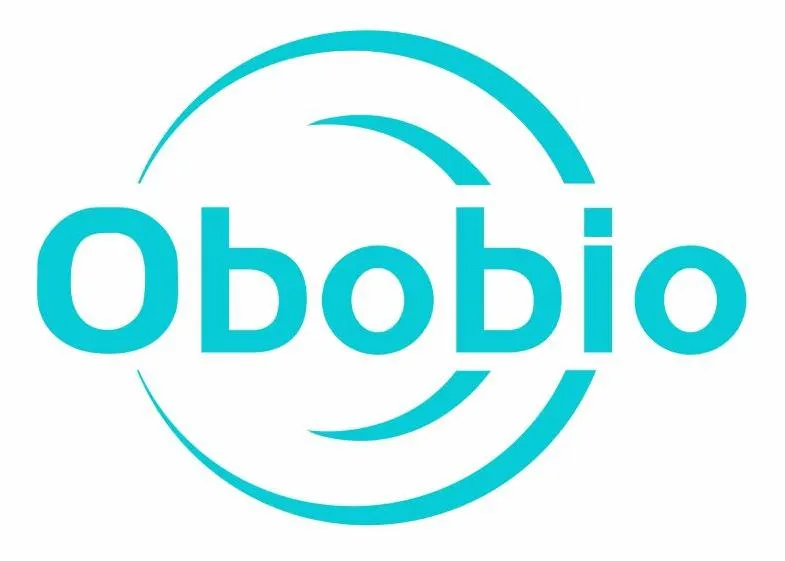Domestic disposable cell culture flasks represent sterile, single-use laboratory vessels designed specifically for growing cells in controlled environments. These flasks have become essential tools for modern research facilities, offering superior contamination control compared to traditional reusable alternatives. Furthermore, domestic production ensures faster delivery times, better quality control, and competitive pricing for laboratory professionals.
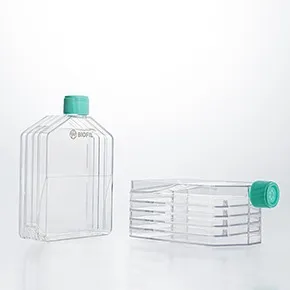
Key Market Statistics: Domestic Disposable Cell Culture Flasks at a Glance
| Market Factor | 2024 Data | 2025-2030 Projection |
|---|---|---|
| Global Cell Culture Vessels Market Size | $4.24 billion | $9.70 billion by 2030 |
| Cell Culture Flasks Specific Market | $1,045.5 million | 15.14% CAGR through 2030 |
| Disposable Culture Market Growth | $3.4 billion in 2024 | $7.1 billion by 2033 |
| Primary Applications | Cell cultivation, research, biopharmaceuticals | Expanding to personalized medicine |
What Makes Domestic Disposable Cell Culture Flasks Superior to Imported Alternatives?
Domestic disposable cell culture flasks provide several key advantages: shorter supply chains, better quality assurance, faster technical support, and compliance with local regulatory standards. Additionally, domestic manufacturers like OBObio can customize products according to specific research requirements while maintaining consistent availability.
Benefits of Choosing Domestic Suppliers:
- Reduced shipping costs – Lower transportation expenses mean better laboratory budgets
- Faster delivery times – Shorter supply chains ensure quicker restocking
- Better quality control – Local manufacturing allows for stricter oversight
- Enhanced technical support – Same time zone customer service and troubleshooting
- Regulatory compliance – Products meet domestic laboratory standards automatically
Moreover, domestic suppliers understand local market needs better. They can provide specialized solutions for regional research priorities and adapt quickly to changing laboratory requirements.
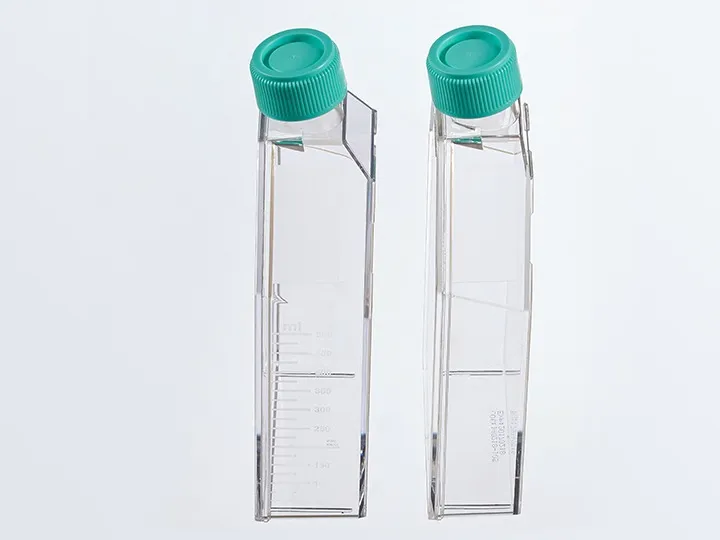
How Do Different Types of Domestic Disposable Cell Culture Flasks Enhance Research Outcomes?
Various flask types serve different research purposes: T-flasks for adherent cell cultures, spinner flasks for suspension cultures, and Erlenmeyer flasks for shaker applications. Each design optimizes specific cellular growth conditions while maintaining sterility throughout the cultivation process.
Common Flask Types and Applications:
T-Flasks (Tissue Culture Flasks):
- Flat growth surfaces ideal for adherent cells
- Available in 25cm², 75cm², and 175cm² sizes
- Perfect for routine cell maintenance and expansion
- Compatible with microscopy observations
Spinner Flasks:
- Designed for suspension cell cultures
- Built-in stirring mechanisms ensure proper mixing
- Ideal for large-scale cell production
- Commonly used in biopharmaceutical manufacturing
Erlenmeyer Shake Flasks:
- Optimized for shaker incubator applications
- Baffled bottoms improve oxygen transfer
- Excellent for microbial cultures and protein expression
- Available in multiple volume capacities
Each flask type incorporates specific design features that enhance cell growth while simplifying laboratory workflows. Cell culture flasks serve as essential vessels for various biotechnology applications.
What Quality Standards Should Domestic Disposable Cell Culture Flasks Meet?
Domestic disposable cell culture flasks must comply with ISO 13485 medical device standards, USP Class VI biocompatibility requirements, and FDA regulations for laboratory equipment. These standards ensure product safety, sterility, and consistent performance across different research applications.
Critical Quality Requirements:
Material Standards:
- Virgin polystyrene construction for biocompatibility
- Gamma irradiation sterilization for contamination prevention
- Endotoxin-free surfaces for sensitive cell cultures
- Chemical resistance to common laboratory solvents
Manufacturing Standards:
- Cleanroom production environments (ISO Class 7 or better)
- Automated quality control systems
- Batch testing and documentation
- Traceability throughout the supply chain
Performance Standards:
- Consistent cell attachment surfaces
- Proper gas exchange capabilities
- Leak-proof sealing systems
- Compatible with standard laboratory equipment
Quality domestic suppliers like OBObio provide certified disposable culture flasks that meet international standards while offering competitive pricing.
Which Applications Benefit Most from Domestic Disposable Cell Culture Flasks?
Primary applications include pharmaceutical research, biotechnology development, academic research, and clinical diagnostics where contamination control and reproducibility are critical success factors. These flasks particularly excel in sterile culture maintenance and scalable production processes.
Key Application Areas:
Pharmaceutical Research:
- Drug discovery and development programs
- Toxicity testing and safety evaluations
- Cell-based assay development
- Therapeutic protein production
Biotechnology Applications:
- Vaccine production and testing
- Monoclonal antibody development
- Stem cell research and therapy
- Tissue engineering projects
Academic Research:
- Basic cell biology studies
- Cancer research investigations
- Genetic engineering experiments
- Microbiology and virology research
Clinical Diagnostics:
- Viral culture and identification
- Cell-based diagnostic assays
- Quality control testing
- Research sample processing
The versatility of domestic disposable cell culture flasks makes them suitable for various laboratory applications across multiple research disciplines.
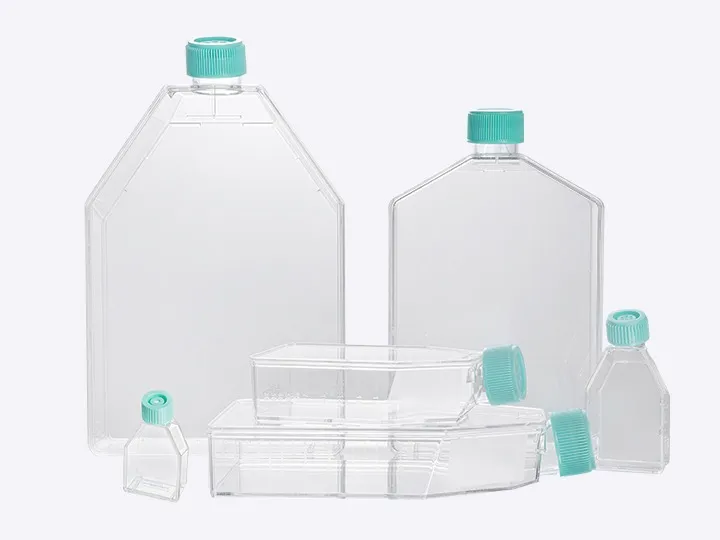
How Do Domestic Disposable Cell Culture Flasks Compare Cost-Effectively to Reusable Options?
When calculating total cost of ownership, domestic disposable cell culture flasks often provide better value through eliminated cleaning costs, reduced contamination risks, and improved research reproducibility. Additionally, they eliminate the need for expensive autoclaving equipment and associated utility costs.
Cost Analysis Breakdown:
| Cost Factor | Disposable Flasks | Reusable Flasks |
|---|---|---|
| Initial Purchase | Higher per unit | Lower per unit |
| Cleaning/Sterilization | None required | Significant labor/utility costs |
| Contamination Risk | Minimal | Higher potential losses |
| Storage Requirements | Compact packaging | Large storage needs |
| Labor Time | Reduced handling | Extensive preparation time |
Hidden Cost Savings:
- Eliminated washing protocols – No detergent, water, or labor costs
- Reduced contamination losses – Fewer ruined experiments and cell lines
- Simplified inventory management – No tracking of cleaning cycles
- Lower facility requirements – Less autoclave and washing equipment needed
- Improved research efficiency – More time for actual research activities
Moreover, domestic sourcing reduces international shipping costs and currency exchange risks, providing more predictable laboratory budgeting.
What Environmental Considerations Apply to Domestic Disposable Cell Culture Flasks?
Modern domestic disposable cell culture flasks increasingly incorporate recycled materials and eco-friendly manufacturing processes while maintaining strict sterility requirements. Furthermore, local production reduces carbon footprints associated with international shipping and transportation.
Environmental Benefits:
Reduced Transportation Impact:
- Lower fuel consumption from shorter shipping distances
- Decreased packaging requirements for domestic delivery
- Reduced carbon emissions compared to international transport
Manufacturing Improvements:
- Cleaner production technologies in domestic facilities
- Better waste management and recycling programs
- Energy-efficient manufacturing processes
- Compliance with environmental regulations
End-of-Life Management:
- Recycling programs for used laboratory plastics
- Proper disposal protocols for contaminated materials
- Partnerships with waste management companies
- Development of biodegradable alternatives
Leading domestic manufacturers are investing in sustainable practices while maintaining the high quality standards required for laboratory applications.
How Should Laboratories Choose the Right Domestic Disposable Cell Culture Flask Supplier?
Successful supplier selection requires evaluating manufacturing capabilities, quality certifications, technical support services, and delivery reliability to ensure consistent laboratory operations. Additionally, consider the supplier’s ability to provide customized solutions and scale with growing research needs.
Supplier Evaluation Criteria:
Quality and Compliance:
- ISO 13485 certification for medical devices
- FDA registration and compliance documentation
- Regular third-party quality audits
- Comprehensive batch testing and documentation
Technical Capabilities:
- Range of flask types and sizes available
- Customization options for specific applications
- Technical support and troubleshooting assistance
- Product development and innovation capacity
Business Reliability:
- Consistent on-time delivery performance
- Competitive pricing and transparent costs
- Flexible ordering and inventory management
- Strong financial stability and market presence
Customer Service:
- Responsive communication and support
- Technical expertise and problem-solving
- Training and educational resources
- Long-term partnership approach
OBObio serves as a reliable lab supply company offering comprehensive solutions for laboratory consumables and equipment needs.
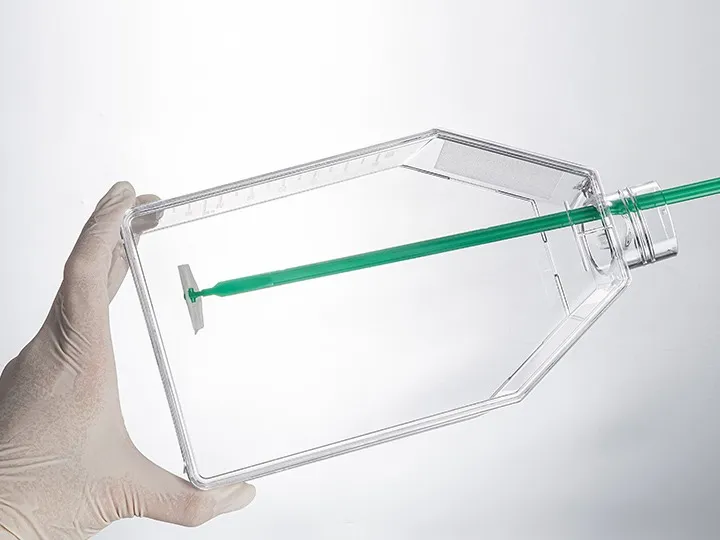
What Future Trends Are Shaping the Domestic Disposable Cell Culture Flask Market?
Emerging trends include smart flask technologies with integrated sensors, sustainable materials development, and automated handling systems that integrate with robotic laboratory equipment. These innovations promise to enhance research efficiency while reducing manual handling requirements.
Innovation Areas:
Smart Technology Integration:
- Embedded sensors for pH and oxygen monitoring
- Wireless data transmission capabilities
- Integration with laboratory information systems
- Real-time culture condition monitoring
Material Science Advances:
- Biodegradable polymer alternatives
- Enhanced surface treatments for cell attachment
- Improved gas permeability materials
- Advanced sterilization-resistant compounds
Automation Compatibility:
- Standardized designs for robotic handling
- Barcode and RFID integration for tracking
- Automated filling and sealing systems
- Compatible with high-throughput screening equipment
Customization Options:
- Application-specific surface modifications
- Custom sizing for specialized equipment
- Unique color coding systems for organization
- Specialized venting and closure options
The future of domestic disposable cell culture flasks lies in combining traditional reliability with cutting-edge technology to support advancing research methodologies.
Frequently Asked Questions About Domestic Disposable Cell Culture Flasks
What is the shelf life of domestic disposable cell culture flasks?
Most domestic disposable cell culture flasks have a shelf life of 2-5 years when stored properly in controlled environments. The exact duration depends on sterilization method, packaging, and storage conditions. Gamma-irradiated cell culture flasks typically maintain sterility longer than other sterilization methods.
Can domestic disposable cell culture flasks be used for all cell types?
Yes, domestic disposable cell culture flasks work effectively with most cell types including mammalian cells, bacterial cultures, yeast, and insect cells. However, specific surface treatments may be required for certain specialized applications. Different flask types optimize growth conditions for adherent versus suspension cultures.
How do I ensure proper sterility when using domestic disposable cell culture flasks?
Domestic disposable cell culture flasks come pre-sterilized and individually packaged. Maintain sterility by working in laminar flow hoods, using aseptic techniques, and avoiding contamination during opening. Never reuse disposable flasks, and inspect packaging for integrity before use.
What sizes are available for domestic disposable cell culture flasks?
Common sizes range from 25cm² to 225cm² for T-flasks, with volumes from 50ml to 2000ml for Erlenmeyer and spinner flasks. Single-use tissue culture flasks are available in multiple configurations to match specific research requirements.
Are domestic disposable cell culture flasks compatible with automated systems?
Modern domestic disposable cell culture flasks are designed for compatibility with automated liquid handling systems, robotic incubators, and high-throughput screening equipment. Check specifications with your equipment manufacturer for optimal compatibility.
How do domestic prices compare to imported alternatives?
Domestic disposable cell culture flasks often provide better total value when considering shipping costs, delivery times, and technical support. While per-unit costs may vary, the overall cost of ownership typically favors domestic suppliers for most laboratory applications.
Conclusion
Domestic disposable cell culture flasks represent a critical component of modern laboratory infrastructure, offering superior quality, reliability, and cost-effectiveness for research applications. As the cell culture vessels market continues growing at over 15% annually, choosing the right domestic supplier becomes increasingly important for laboratory success.
The advantages of domestic sourcing – including faster delivery, better technical support, and competitive pricing – make domestic disposable cell culture flasks an intelligent choice for forward-thinking laboratories. Furthermore, the continuous innovation in materials science and smart technologies promises even greater value in the future.
Ready to upgrade your laboratory with premium domestic disposable cell culture flasks? Contact OBObio today to discuss your specific requirements and discover how our comprehensive range of laboratory consumables can enhance your research outcomes. Our team of experts is ready to help you select the perfect flask types for your applications while providing ongoing technical support and competitive pricing.
Take the first step toward improved research efficiency and reliability – explore our complete product catalog or request a custom quote for your laboratory’s unique needs today!
Ask for free sample today
🔐 Privacy respected. No spam. Ever.
